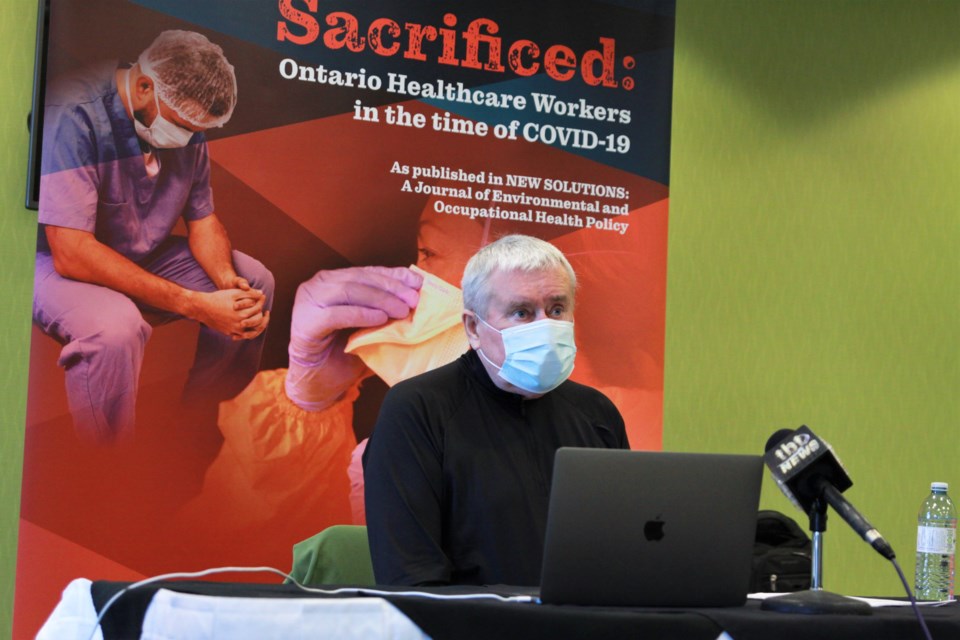THUNDER BAY – A new study exploring Ontario health care workers’ experience during COVID-19 found deep concerns that workers are understaffed, overworked, and inadequately protected.
Occupational health researchers Jim Brophy and Margaret Keith virtually presented the results of their peer-reviewed study, Sacrificed: Ontario Healthcare Workers in the Time of COVID-19, on Tuesday in Thunder Bay.
The pair, both adjunct assistant professors at the University of Windsor, worked with the Ontario Council of Hospital Unions/Canadian Union of Public Employees (OCHU/CUPE), which helped recruit workers for interviews that took place in April and May..
The results show COVID-19 exposed faults in an already overburdened health system, they argue, with health workers bearing the consequences.
“Health care workers feel abandoned by their governments, which failed to prepare for an inevitable epidemic, despite recommendations," they state in the study. "The knowledge that they are at increased risk of infection due to lack of protection has resulted in anger, frustration, fear, and a sense of violation that may have long-lasting implications.”
The researchers spoke with five registered practical nurses who worked in long-term care and hospital settings, two personal support workers (PSWs) who worked in long-term care, two hospital clerical staff, and one hospital cleaner.
The in-depth interviews sought to understand the lived experience of workers, after an OCHU/CUPE poll of 3,000 members found 87 per cent felt there was not enough personal protective equipment (PPE) on hand to keep them safe.
Excerpts from the interviews highlight the daily anxiety of working in health care during the pandemic. Workers described the emotional strain of trying to support patients and their families amid COVID-19 rules restricting access while managing large workloads.
“I’ve come home and cried many times. I’m stressed out. I can’t sleep at night. There’s a lot of us having trouble sleeping,” said one nurse who works in a large hospital.
“When COVID-19 is over, the employer won’t have enough counselors on hand to handle what I think is going to hit,” said another nurse. “People are anxious; people are fearful; they come to work; they don’t know if they have the illness or not, because sometimes you’re asymptomatic. They’re afraid to go home; their families are scared of them. It is just horrendous. And the morale is as low as it can be.”
Workers quoted in the study say the situation was exacerbated by restricted access to PPE. Several pointed to instances where they or a colleague were denied an N95 mask while interacting with a suspected or confirmed case of COVID-19.
Some of the workers denied N95s went on to contract COVID-19, they say.
The masks, which provide superior protection compared to a standard medical mask, have been rationed and often kept under lock and key at health facilities.
Brophy and Keith say the situation was a result of governments’ failure to learn the lessons of the SARS outbreak of 2003.
Most of Ontario’s 55-million mask stockpile of N95s had expired and not been replaced when the pandemic hit.
Several workers also raised concerns that COVID-19-related workplace safety complaints were not being taken seriously by the Ministry of Labour.
The study concludes the pandemic should bring attention to shortcomings in Ontario’s health system that made it more vulnerable to being overwhelmed.
The situation was especially acute in long-term care, workers suggested.
OCHU/CUPE president Michael Hurley, a study co-author, said there were models of more successful government approaches elsewhere in the world that Ontario should seek to emulate.
Recommendations from the study include increasing staffing levels in Ontario’s hospitals and LTC homes, providing mental health supports to health care workers to mitigate the psychological impact of working during the pandemic, and halting the trend toward privatization, which they found worsened outcomes in LTC homes.
The study is open access and is available online.
